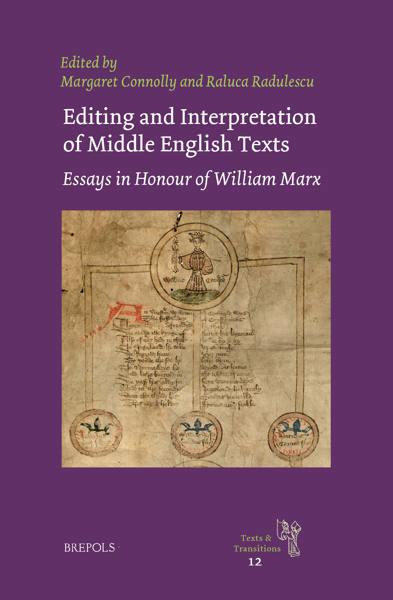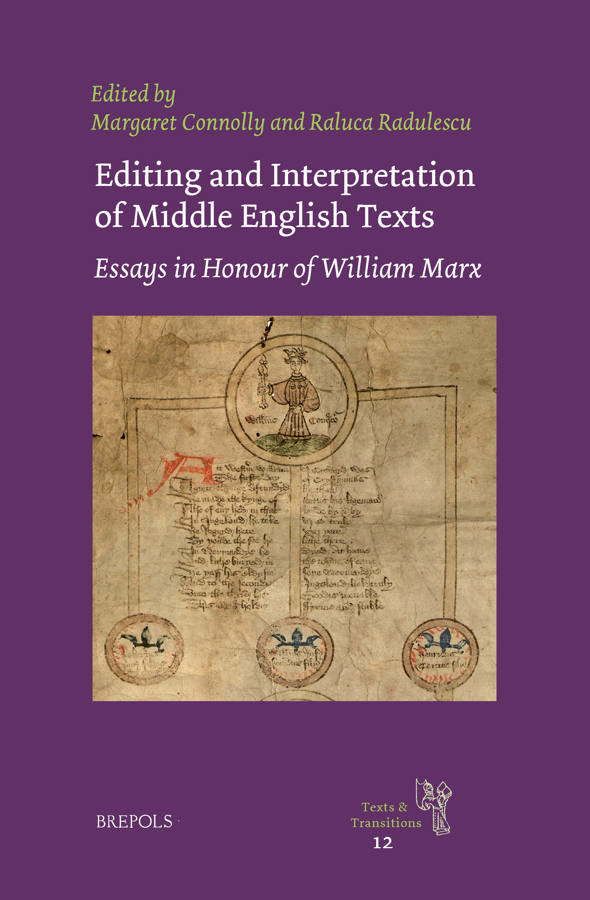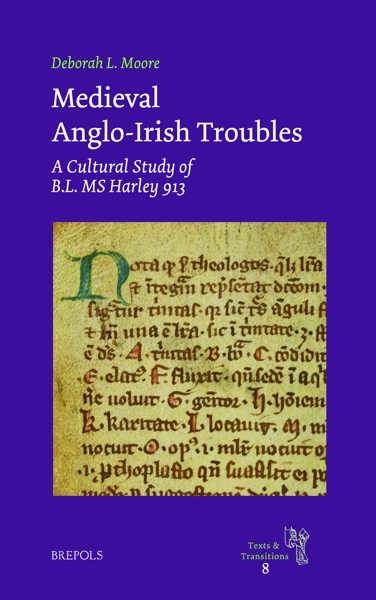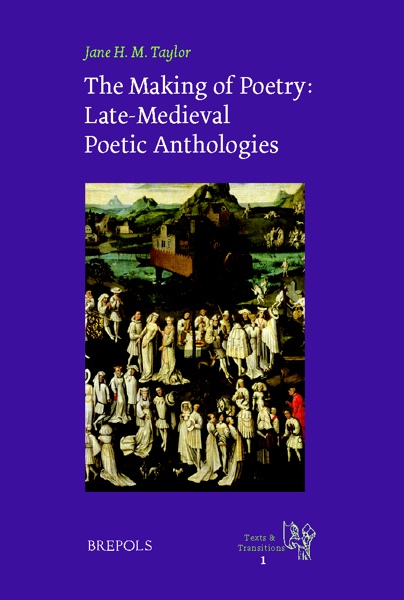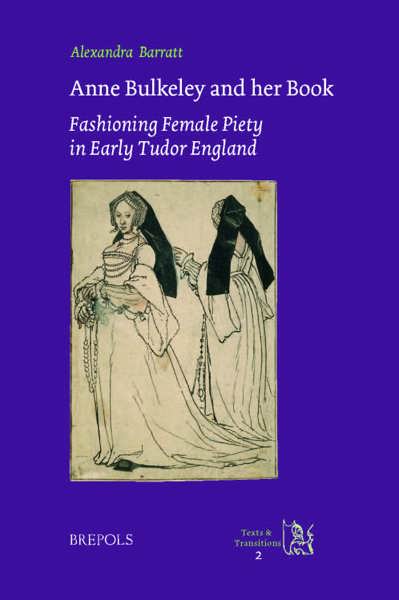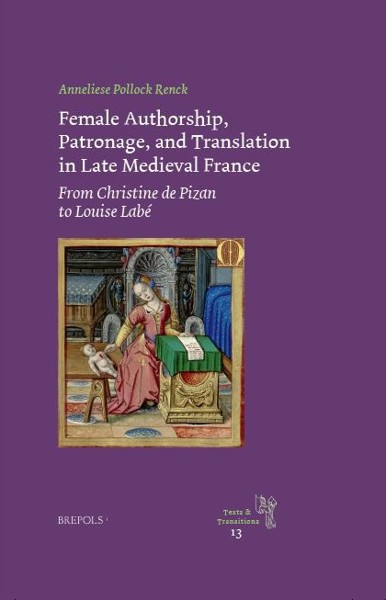
Editing and Interpretation of Middle English Texts
Essays in Honour of William Marx
Margaret Connolly, Raluca Radulescu (eds)
- Pages: 355 p.
- Size:156 x 234 mm
- Illustrations:30 b/w, 2 col., 6 tables b/w.
- Language(s):English
- Publication Year:2018
- € 105,00 EXCL. VAT RETAIL PRICE
- ISBN: 978-2-503-56847-8
- Hardback
- Available
- € 105,00 EXCL. VAT RETAIL PRICE
- ISBN: 978-2-503-56848-5
- E-book
- Available
Fifteen new essays that explore issues related to the editing and interpretation of Middle English literature.
“All in all, the contributors to this well-edited volume display the vitality and rigour of a William Marx-driven ethos of early book scholarship. In common, they scrutinize the conditions and effects of production, transmission, and reception to reach well-honed conclusions.” (Susanna Fein, in Review of English Studies, August 2018)
“This collection of essays makes a rich and rewarding contribution to scholarship on editing Middle English texts as well as their broader interpretation, and as such provides a fitting tribute to William Marx.” (Medium Aevum, 88/1, 2019, p. 199)
“This volume of essays belongs on the bookshelf of any scholar interested in the complicated but rewarding nature of editing and interpreting Middle English texts. The contributors honor William Marx through the depth and rigor of their essays that continue the intellectual conversations that he has had with the above mentioned works, and the editors are to be commended for assembling a cohesive, thoughtful, and attractive festschrift that embraces and advances the honoree's intellectual passions.” (Alexander L. Kaufman, in The Medieval Review, 05/02/2020)
These fifteen essays, all published here for the first time, explore issues related to the editing and interpretation of Middle English literature. These include the treatment of all types of evidence (variant readings; punctuation; capitalization; rubrication; physical layout), in relation to both manuscript transmission and the transition from manuscript to print. The editorial representation of these and other aspects constitutes an act of textual interpretation at the most fundamental level, which subsequently influences scholarly understanding. Two major fields of writing, religious texts and chronicles, provide the focus of this enquiry. Major works that receive attention include Trevisa’s translation of the Polychronicon, the Middle English Brut, Piers Plowman, Love’s Mirror of the Blessed Life of Jesus Christ, and Mirk’s Festial; a wide range of shorter devotional and historical texts, in both verse and prose, is also considered, as are aspects related to the translation of texts into Middle English. Almost all of the contributors are experienced editors of medieval texts. Some contribute further insights about texts they have edited, whilst others offer new editions of previously unpublished works. Collectively these essays foreground the many and varied matters of interpretation that confront the editor of Middle English texts.
Illustrations
Acknowledgements
Abbreviations
Preface: Carl William Marx — DEREK PEARSALL
Introduction — MARGARET CONNOLLY and RALUCA RADULESCU
I Interpreting the Textual Evidence
Aspects of Method in the Athlone Edition of Piers Plowman — A. S. G. EDWARDS
Whose Punctuation Is It, Anyway?: A Sampling of Some Manuscripts of the Polychronicon — RONALD WALDRON
London, British Library, MS Additional 10304: Caesural Pause Marks – a Help to the Reader? — JANET COWEN
Binomials in the Middle English and Early Modern English Versions of Boccaccio’s De Mulieribus Claris — HANS SAUER
II Editing and Interpreting Chronicles
The Case of the Cutting Copyist: Or, How London, British Library, MS Sloane 2027 of Robert of Gloucester’s Chronicle lost 4000 Lines — ERIK KOOPER
English Chronicle Narratives of the Rising of 1381 — ANDREW PRESCOTT
The Middle English Brut Chronicles and the Modern Editor — RALUCA RADULESCU
Robert Fabyan’s Two Hats: Compiling The Great Chronicle of London and The New Chronicles of England and France — JULIA BOFFEY
III Editing and Interpreting Religious Texts
Verse to Prose or Prose to Verse? A Problematic Text of The Nine Points Best Pleasing to God — OLIVER PICKERING
Further Thoughts on Editing the Festial — SUE POWELL
The Edited Text and the Selected Text and the Problem of Critical Editions — MARGARET CONNOLLY
Problems in Indexing and Editing Middle English Prayer as Illustrated by the Chester Processional Texts — VERONICA O’MARA
The Use of Sources in the Historye of the Patriarks and Caxton’s Golden Legend — MAYUMI TAGUCHI
Revisiting Nychodemus Gospell — MARTHA DRIVER
Reformations, Reading Practices, and Textual Afterlives: the Pseudo-Bonaventuran Tradition, c. 1400–1600 — JOHN J. THOMPSON
***
William Marx: List of Publications
Index of Manuscripts
General Index
Tabula Gratulatoria
